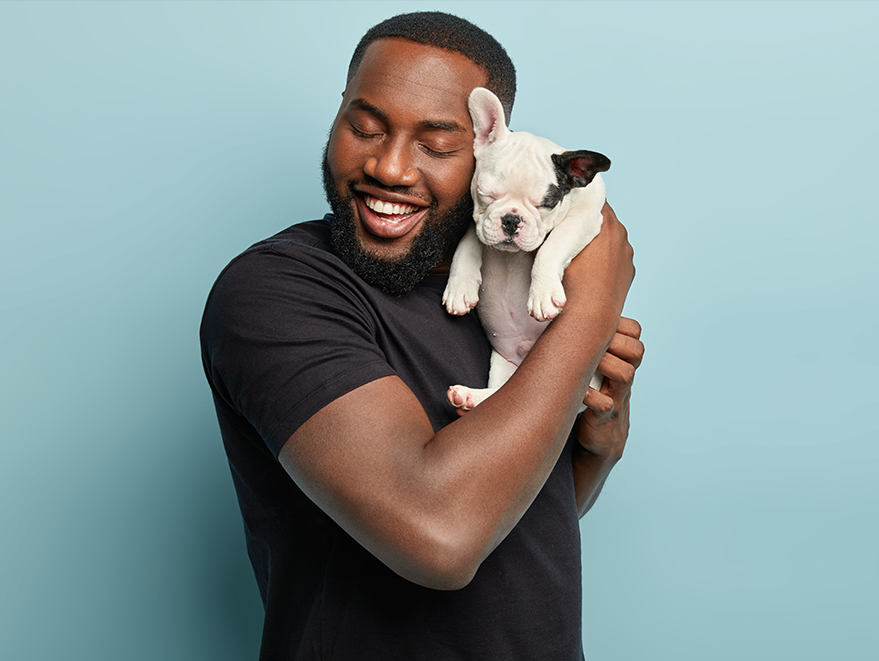Pet Dentistry in Onondaga County
Caring for Your Pet's Teeth in Liverpool
Bad breath in cats and dogs is caused by an overgrowth of bacteria. Without proper cleaning, bacteria will turn into plaque and tartar buildup on the teeth and gums which can lead to dental disease. When left untreated, dental disease can cause lasting, systemic effects on your pet’s internal organs, including the heart and liver, which can significantly shorten their life.
Even if you are using dental cleaning treats and chews, they are usually not enough to prevent dental disease. It is recommended by the American Animal Hospital Associates (AAHA) that pets be brought in at least once a year for a dental exam and cleaning.
Common Signs of Periodontal Disease
You'll want to be on the lookout for the following signs of periodontal disease. It's important to let your veterinarian know when you notice these symptoms in your own pet. They are as follows:
- Bad breath
- Bleeding gums
- Blood in water bowl or on chew toys (after the age of teething)
- Excessive drooling
- Lack of appetite
- Loose or missing teeth
- Pain while chewing
- Red gums
- Swollen gums
- Teeth discoloration
Contact Liverpool Animal Health Center online or by calling us at (319) 622-2882 today to learn how we can help improve your pet’s dental health and help prevent periodontal disease.
State-of-the-Art Facilities and Equipment
We take pride in our state-of-the-art facilities and advanced dental equipment, ensuring that your pet receives the highest standard of care. Our modern dental suite is equipped with cutting-edge technology, allowing us to perform dental procedures with precision and efficiency while minimizing discomfort for your pet.
How Often Should I Have My Pet's Teeth Professionally Cleaned?
Regular dental cleanings are essential for maintaining your pet's oral health. We recommend scheduling a professional dental cleaning for your pet at least once a year. However, some pets may require more frequent cleanings depending on their individual dental health needs.
What to Expect at Your Pet’s Dental Exam
During a dental exam with one of our Liverpool Veterinarians, your pet’s teeth, gums and mouth will be thoroughly examined for any signs of plaque, tartar and dental disease. Following the exam, we will recommend a course of treatment which may include a more in-depth dental exam with sedation for advanced cases, a dental cleaning, teeth extractions, or options for at-home care.
Schedule a Liverpool Pet Dental Care Appointment
Our goal at Liverpool is to ensure that your pet receives the best possible care to ensure they live a long, health, happy life. Even if you think your pet’s teeth and gums look healthy, reach out to one of our experts so that they can provide steps on how to keep them that way!
Now, for a limited time, we are $100 - $400 off your pet’s next dental cleaning depending on the severity of their dental health. Contact us today at (319) 622-2882 to learn more about this offer!

Real Stories From Real Owners
Read Our Reviews-
“Such an amazing experience at a veterinarian office”
- Tabitha G. -
“Given the utmost care & treatment”
- Kate F. -
“My family will be back! Thanks for a great experience!”
- Traci K.

Liverpool Animal Health Center
Exceeding Expectations-
Devoted to the Longevity and Health of Your Pet
We’re here to help and educate you on responsible pet care and preventive health care so you can be ready to assist your loved one throughout every stage of their life.
-
Excellent Practice Standards in the Veterinary Field
We are Accredited by the American Animal Hospital Association (AAHA) and New York State Veterinary Medical Society (NYSVMS).
-
Committed to Exceeding Client Expectations
We have a skilled and educated team of vets who love animals, big and small, and are ready to listen to your needs.

Dedicated to providing the best care for the wellness of your loving pets




.jpg)